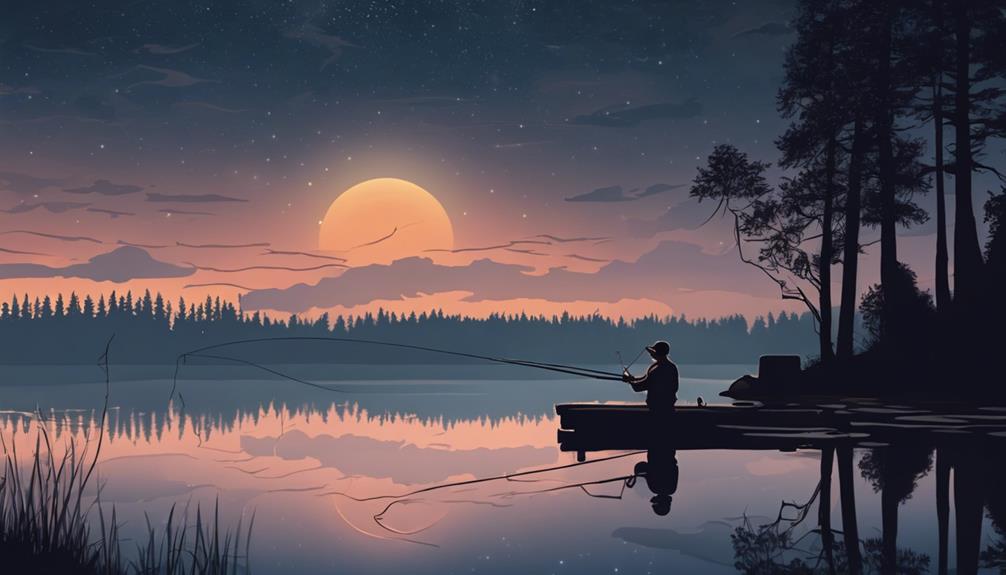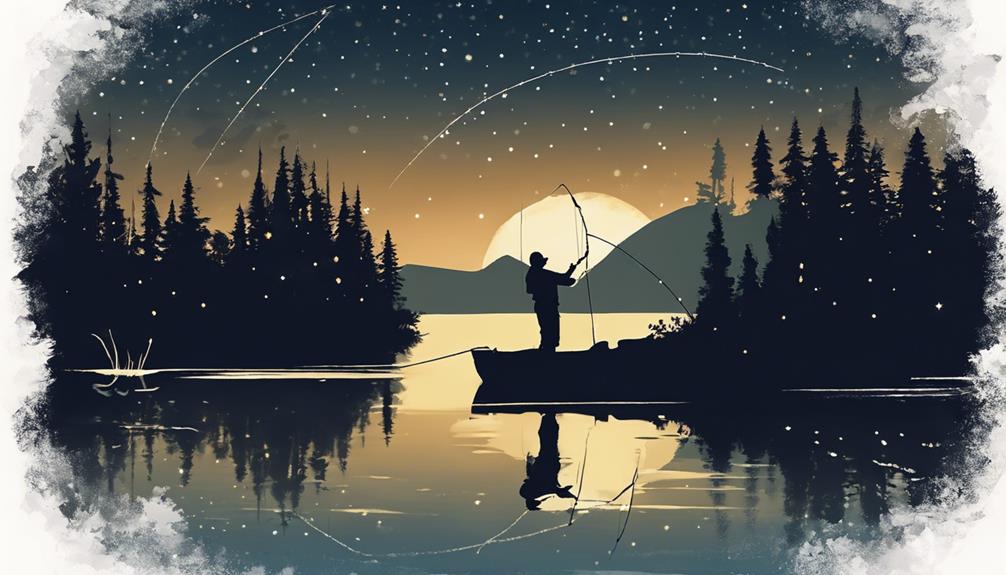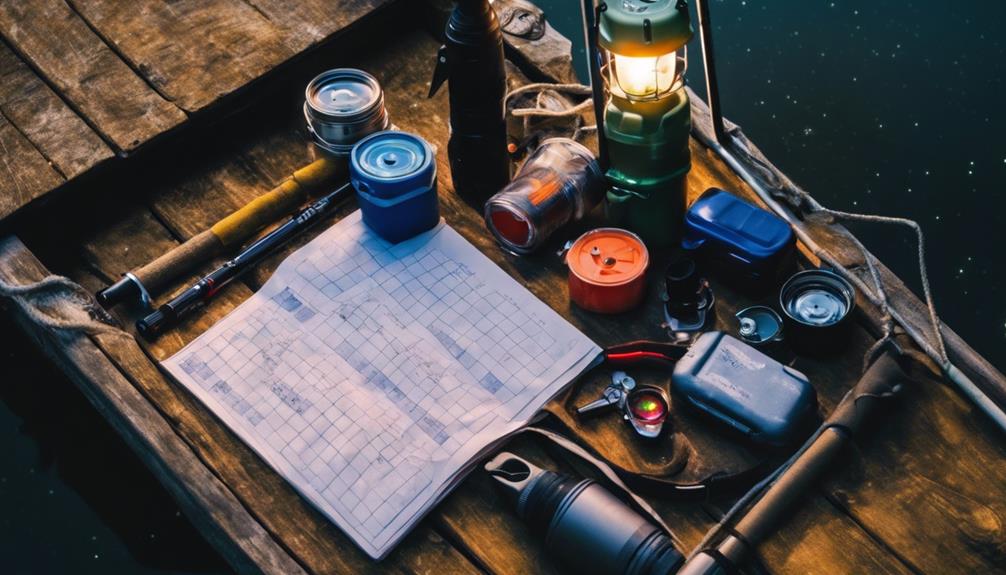To comply with night fishing rules in your state: Fish during sunset to sunrise. Obtain required permits in advance for conservation efforts. Respect prohibited areas for ecosystem preservation. Carry necessary equipment like a bright light, whistle, reflective tape, and a first aid kit. Stay legal, safe, and eco-conscious while enjoying nighttime fishing.
Legal Night Fishing Hours
In your state, night fishing hours are typically defined as the period from sunset to sunrise, allowing anglers to pursue their favorite hobby under the cover of darkness. When engaging in night fishing, it's crucial to prioritize safety precautions and adhere to best practices to ensure a successful and secure fishing experience.
Safety precautions are paramount when night fishing. To enhance visibility and ensure personal safety, it's advisable to bring along a reliable and waterproof flashlight. Additionally, wearing reflective clothing and a personal flotation device can greatly reduce the risks associated with fishing in low-light conditions. Always inform someone of your fishing location and expected return time for added safety measures.
Wildlife interactions and environmental impact are important considerations during night fishing excursions. Be mindful of local wildlife, such as nocturnal animals or protected species, to avoid disturbances or accidental encounters. Properly dispose of any trash or fishing equipment to maintain the cleanliness of the fishing environment and protect aquatic habitats.
Required Night Fishing Permits
When planning your night fishing excursions, it's imperative to familiarize yourself with the required permits for engaging in this activity within your state. Night fishing permits are essential to ensure that anglers comply with regulations, promote conservation efforts, and contribute to overall safety during nighttime fishing activities. These permits often come with specific guidelines and restrictions to help protect both the environment and the anglers themselves.
Night fishing restrictions may vary from state to state, so it's crucial to research and obtain the necessary permits before heading out. These permits typically outline the designated night fishing hours, areas where night fishing is allowed, and any specific rules or equipment requirements for fishing after dark. By obtaining the proper permit, you not only abide by the law but also contribute to the sustainable management of fish populations and their habitats.
In addition to the legal aspects, night fishing permits also play a vital role in ensuring night fishing safety. They help authorities keep track of individuals engaging in this activity, making it easier to provide assistance in case of emergencies. Moreover, night fishing permits may include safety guidelines such as carrying a light source, wearing reflective gear, or informing someone of your fishing plans before heading out. Overall, obtaining the required night fishing permit isn't just a legal obligation but a way to prioritize safety and conservation while enjoying the tranquility of fishing under the stars.
Prohibited Night Fishing Locations
Night fishing in restricted areas is subject to enforcement measures to protect sensitive ecosystems and ensure angler safety. It's crucial to adhere to these regulations to mitigate potential risks and protect the environment. Safety precautions are put in place to prevent accidents and ensure the well-being of anglers engaging in night fishing activities. By avoiding prohibited night fishing locations, you can help maintain a balance between recreation and conservation efforts.
One of the main reasons certain areas are off-limits for night fishing is to minimize wildlife interaction. Nocturnal animals may be disturbed by the presence of anglers during their active hours, leading to potential conflicts or disruptions in their natural behaviors. Additionally, environmental impact is a significant concern in these restricted zones. Excessive noise pollution from night fishing activities can disrupt the surrounding ecosystem, affecting both aquatic and terrestrial species.
Respecting the prohibition of night fishing in specific locations is essential for the preservation of biodiversity and the overall health of the ecosystem. By understanding and following these restrictions, you contribute to the sustainability of the environment and help protect vulnerable species from unnecessary disturbances. Be mindful of the designated areas where night fishing is prohibited and prioritize the conservation of natural habitats.
Mandatory Night Fishing Equipment
To ensure your safety and compliance with regulations while engaging in nighttime fishing activities, specific equipment is mandated for use during your angling expeditions. Safety precautions are paramount when venturing out for night fishing. Essential gear includes a reliable and bright light source, such as a headlamp or flashlight. These are crucial for navigating the fishing spot, setting up equipment, and handling your catch in the dark. Additionally, having a whistle or horn onboard can be vital in alerting others in case of an emergency.
Furthermore, it's mandatory to have reflective tape or stickers on your fishing gear and boat to enhance visibility to other anglers, watercraft, or rescue personnel. This simple addition can significantly improve safety during nighttime fishing excursions, reducing the risk of collisions or accidents on the water. In some states, carrying a first aid kit specifically tailored for fishing-related injuries is a requirement. This kit should include supplies for treating cuts, hooks, and other common fishing wounds that may occur in the dark.
Frequently Asked Questions
Can I Use Artificial Lights While Night Fishing?
When night fishing, using artificial lights can be beneficial for attracting fish and ensuring your safety. Artificial lights can help you see your surroundings better and make it easier to handle equipment.
Additionally, they can attract baitfish and insects, which in turn attract larger fish. For night fishing techniques using artificial lures, consider using lighted lures or glow-in-the-dark options to increase visibility and lure in your catch effectively.
Are There Any Restrictions on Bait Types for Night Fishing?
When night fishing, you should be aware of regulations on lighting and bait choices. Different bait types may have restrictions depending on your location. Always check local guidelines to ensure you're using approved baits.
Additionally, make sure that any artificial lights you use comply with the regulations. By following these rules, you can enjoy your night fishing experience while staying in line with the regulations set in place.
Are There Specific Rules for Catch-And-Release During Night Fishing?
When engaging in catch-and-release during night fishing, it's important to consider fish behavior and environmental impact. Fish may be more active or sensitive to stress during nighttime hours, so handling them carefully is crucial for their well-being.
Properly releasing fish can help maintain fish populations and protect the ecosystem. By following guidelines for catch-and-release, you can help ensure that fish have a better chance of survival after being caught.
Can Children Participate in Night Fishing With Adult Supervision?
When considering allowing children to participate in night fishing with adult supervision, it's crucial to address safety concerns. Parental responsibility is key in ensuring the well-being of the children during the activity. Prioritize safety measures such as wearing life jackets, using proper lighting, and setting boundaries.
Additionally, teach children about potential risks and how to respond in emergencies. With proper precautions and supervision, children can enjoy night fishing safely and responsibly.
Are There Any Special Rules for Night Fishing in Designated Wildlife Areas?
When night fishing in designated wildlife areas, you should be aware of special rules that may apply. Safety precautions are crucial to ensure a positive experience for both you and the wildlife.
Keep noise pollution to a minimum to avoid disturbing animals. Additionally, be mindful of the environmental impact of your activity.
Conclusion
Remember to always check and follow your state's regulations when night fishing. Knowing the legal hours, permits required, prohibited locations, and necessary equipment is crucial to ensure a safe and enjoyable fishing experience.
By staying informed and compliant with the rules, you can help protect the environment and preserve the fishing resources for future generations.
Happy fishing!



